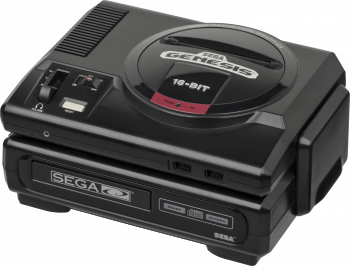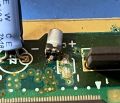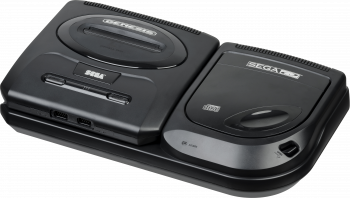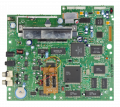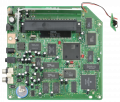Genesis:Sega CD Model Differences: Difference between revisions
| (2 intermediate revisions by the same user not shown) | |||
| Line 8: | Line 8: | ||
=== “CD (Model 1; front-loading tray)” (1991-1993) === | === “CD (Model 1; front-loading tray)” (1991-1993) === | ||
[[Image:Sega CD Model 1.png|right|thumb|350px|A model 1 Sega CD with a model 1 Genesis console attached.]] | [[Image:Sega CD Model 1.png|right|thumb|350px|A model 1 Sega CD with a model 1 Genesis console attached.]] | ||
The initial model of the Sega/Mega CD, originally released in December 1991 in Japan, followed by North America in late 1992 and PAL regions during the spring of 1993. It is easily distinguished by its front-loading CD tray and the fact that it sits directly underneath the Genesis/Mega Drive with the expansion connector protruding on the right-hand side. It is designed to specifically pair with a model 1 console, but can be used with a model 2 by removing the console's rubber feet (this is even mentioned in the model 2 manual). There are no controls on the add-on itself; the disc tray is opened by using the system menu or resetting the attached console, and is closed by using the system menu. Green "Ready" and red "Access" LEDs are on the front bezel while all connections (DC input, RCA audio out and 3.5 mm audio in) are grouped together at the rear. | The initial model of the Sega/Mega CD, originally released in December 1991 in Japan, followed by North America in late 1992 and PAL regions during the spring of 1993. It is easily distinguished by its front-loading CD tray and the fact that it sits directly underneath the Genesis/Mega Drive with the expansion connector protruding on the right-hand side. It is designed to specifically pair with a model 1 console, but can be used with a model 2 by removing the console's rubber feet (this is even mentioned in the model 2 manual). There are no controls on the add-on itself; the disc tray is opened by using the system menu or resetting the attached console, and is closed by using the system menu. Green "Ready" and red "Access" LEDs are on the front bezel while all connections (DC input, RCA audio out and 3.5 mm audio in) are grouped together at the rear. Japanese and PAL model 1s also have small diagrams on the front showing what the different LED light patterns mean. | ||
All Japanese and most North American units have a drive mechanism manufactured by Sony while most PAL units have a drive made by JVC. | All Japanese and most North American units have a drive mechanism manufactured by Sony while most PAL units have a drive made by JVC. | ||
| Line 25: | Line 25: | ||
[[Image:Sega CD Model 2.png|right|thumb|350px|A model 2 Sega CD with a model 2 Genesis console attached.]] | [[Image:Sega CD Model 2.png|right|thumb|350px|A model 2 Sega CD with a model 2 Genesis console attached.]] | ||
Introduced in early 1993 alongside the model 2 Genesis/Mega Drive, the model 2 Sega CD was a drastic redesign which did away with the front-loading tray in favor of a cheaper top-loading design. This is perhaps the most common version of the Sega/Mega CD, especially outside Japan. The Genesis/Mega Drive sits on top of a thin base which houses the unit's motherboard while the drive mechanism sits to the side of the attached console. Although designed to match the model 2 console, a model 1 Genesis/Mega Drive can be used on the model 2 albeit with the console partially hanging off the side. Sega included an extension piece to provide full support when used with a model 1. A lone disc access LED is on the top front, while all the rear connections are exactly the same as on the model 1. | Introduced in early 1993 alongside the model 2 Genesis/Mega Drive, the model 2 Sega CD was a drastic redesign which did away with the front-loading tray in favor of a cheaper top-loading design. This is perhaps the most common version of the Sega/Mega CD, especially outside Japan. It was also the only version of the Sega CD hardware to see a release in Brazil. The Genesis/Mega Drive sits on top of a thin base which houses the unit's motherboard while the drive mechanism sits to the side of the attached console. Although designed to match the model 2 console, a model 1 Genesis/Mega Drive can be used on the model 2 albeit with the console partially hanging off the side. Sega included an extension piece to provide full support when used with a model 1. A lone disc access LED is on the top front, while all the rear connections are exactly the same as on the model 1. | ||
Two major revisions of the model 2 CD exist, one with a board manufactured by Funai and another manufactured by Sony. Funai boards are physically larger and contain all of the drive controller circuitry and associated ICs. Sony boards are smaller and have the drive controller circuitry offloaded onto a separate board which the laser is connected to. For North American Sega CDs, these can be easily determined by looking at the label listing the manufacture date. Funai units will be marked with "FN" while Sony units have "SNA". Funai systems have either a Sony or Samsung laser whereas Sony units can have either a JVC or Sony laser. | Two major revisions of the model 2 CD exist, one with a board manufactured by Funai and another manufactured by Sony. Funai boards are physically larger and contain all of the drive controller circuitry and associated ICs. Sony boards are smaller and have the drive controller circuitry offloaded onto a separate board which the laser is connected to. For North American Sega CDs, these can be easily determined by looking at the label listing the manufacture date. Funai units will be marked with "FN" while Sony units have "SNA". The model number is also different between the two for North American systems; Funai units have the model number "MK-4102" while Sony units have the model number "MK-4102A". Japanese Funai systems have the model number "HAA-2912" while Japanese Sony systems have the model number "HAA-2912A". Funai systems have either a Sony KSS-210A or Samsung SOH-04T laser, whereas Sony units can have either a JVC Optima-6 or Sony KSS-210A laser. | ||
In terms of reliability, the model 2 CD is far more robust and does not have issues with leaky capacitors or tray issues considering its top loading nature. The most common fault with the model 2 is the fuse, which can be blown if the wrong AC adapter is used or if the Genesis/Mega Drive is attached or removed while the CD is still plugged into power. Thankfully this is easily repairable and can restore the add-on to working order again. | In terms of reliability, the model 2 CD is far more robust and does not have issues with leaky capacitors or tray issues considering its top loading nature. The most common fault with the model 2 is the fuse, which can be blown if the wrong AC adapter is used or if the Genesis/Mega Drive is attached or removed while the CD is still plugged into power. Thankfully this is easily repairable and can restore the add-on to working order again. | ||
Latest revision as of 18:10, 2 September 2024
Some page content & researching taken from io55.net's Genesis Add-Ons page with permission, in collaboration.
Models
Models are arranged chronologically.
“CD (Model 1; front-loading tray)” (1991-1993)
The initial model of the Sega/Mega CD, originally released in December 1991 in Japan, followed by North America in late 1992 and PAL regions during the spring of 1993. It is easily distinguished by its front-loading CD tray and the fact that it sits directly underneath the Genesis/Mega Drive with the expansion connector protruding on the right-hand side. It is designed to specifically pair with a model 1 console, but can be used with a model 2 by removing the console's rubber feet (this is even mentioned in the model 2 manual). There are no controls on the add-on itself; the disc tray is opened by using the system menu or resetting the attached console, and is closed by using the system menu. Green "Ready" and red "Access" LEDs are on the front bezel while all connections (DC input, RCA audio out and 3.5 mm audio in) are grouped together at the rear. Japanese and PAL model 1s also have small diagrams on the front showing what the different LED light patterns mean.
All Japanese and most North American units have a drive mechanism manufactured by Sony while most PAL units have a drive made by JVC.
Service Notes
Unfortunately, the model 1 is plagued with reliability issues such as bad tray belts, dirty limiter switches, faulty helix/Archimedes screws on Sony drives, and leaky capacitors. The main board in particular contains a number of SMD capacitors which must be replaced, even if there are no visible signs of leakage. Leaky capacitors can also be found on the "sub" board in the vicinity of the voltage regulator. Systems with a JVC-manufactured drive can also suffer from bad capacitors on the drive controller board.
“CD (Model 2; top loader)” (1993-1996)
Introduced in early 1993 alongside the model 2 Genesis/Mega Drive, the model 2 Sega CD was a drastic redesign which did away with the front-loading tray in favor of a cheaper top-loading design. This is perhaps the most common version of the Sega/Mega CD, especially outside Japan. It was also the only version of the Sega CD hardware to see a release in Brazil. The Genesis/Mega Drive sits on top of a thin base which houses the unit's motherboard while the drive mechanism sits to the side of the attached console. Although designed to match the model 2 console, a model 1 Genesis/Mega Drive can be used on the model 2 albeit with the console partially hanging off the side. Sega included an extension piece to provide full support when used with a model 1. A lone disc access LED is on the top front, while all the rear connections are exactly the same as on the model 1.
Two major revisions of the model 2 CD exist, one with a board manufactured by Funai and another manufactured by Sony. Funai boards are physically larger and contain all of the drive controller circuitry and associated ICs. Sony boards are smaller and have the drive controller circuitry offloaded onto a separate board which the laser is connected to. For North American Sega CDs, these can be easily determined by looking at the label listing the manufacture date. Funai units will be marked with "FN" while Sony units have "SNA". The model number is also different between the two for North American systems; Funai units have the model number "MK-4102" while Sony units have the model number "MK-4102A". Japanese Funai systems have the model number "HAA-2912" while Japanese Sony systems have the model number "HAA-2912A". Funai systems have either a Sony KSS-210A or Samsung SOH-04T laser, whereas Sony units can have either a JVC Optima-6 or Sony KSS-210A laser.
In terms of reliability, the model 2 CD is far more robust and does not have issues with leaky capacitors or tray issues considering its top loading nature. The most common fault with the model 2 is the fuse, which can be blown if the wrong AC adapter is used or if the Genesis/Mega Drive is attached or removed while the CD is still plugged into power. Thankfully this is easily repairable and can restore the add-on to working order again.
References
https://en.wikipedia.org/wiki/Sega_CD
https://gametrog.com/sega-cd-model-1-2-information-specs/
https://gametrog.com/how-which-sega-cd-system-do-i-have/ (howto tips)
https://www.reddit.com/r/SEGAGENESIS/comments/8w7fpa/model_1_or_2_sega_cd/
https://gametrog.com/how-to-connect-hook-up-sega-cd-1-front-loader-to-genesis-model-2/ (M1 CD on M2 Genesis)
https://gametrog.com/how-to-connect-hook-up-sega-cd-2-clam-tray-loader-to-genesis-model-1/ (M2 CD on M1 Genesis)
